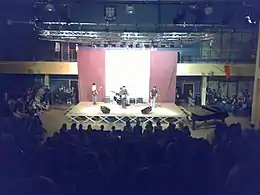
A talent show is an event in which participants perform the arts of singing, dancing, lip-syncing, acting, martial arts, playing an instrument, poetry, comedy or other activities to showcase skills. Many talent shows are performances rather than contests, but some are actual contests. In the instance of a contest, participants may be motivated to perform for a reward, trophy, or prize of some kind. For example, a high school might not have many students with any interest in performing in front of the student body for the sole purpose of performing alone and may offer different prizes as an incentive for these students to participate in the contest.[1]
Media
Since the late 1940s, talent shows have become a notable genre of reality television,[2] such as Doorway to Fame (1947), The Original Amateur Hour (1948), Hollywood Screen Test (1948), Opportunity Knocks (1949), Chance of a Lifetime (1952), NHK Nodo Jiman (1953), New Faces (1963), Notun Kuri (1966), The Gong Show (1976), Star Search (1983), Soundmixshow (1985), Showtime at the Apollo (1987), Popstars (1999), Amici di Maria De Filippi (2001), Idol (2001), Star Academy (2001), Last Comic Standing (2003), Dancing with the Stars (2004), The X Factor (2004), So You Think You Can Dance (2005), Dancing on Ice (2006), Got Talent (2006), How Do You Solve a Problem like Maria? (2006), Last Choir Standing (2008), The Sing-Off (2009), The Voice (2010), The Glee Project (2011), Q'Viva! The Chosen (2012), El Numero Uno (2012), Duets (2012), Top Talent (2013), Rising Star (2013), Tri Akkorda (Russian talent show) (2014), Masked Singer (2015), Little Big Shots (2016), Dance Se Puder (2016), Dance Dance Dance (2017), Let It Shine (2017), World of Dance (2017), The Four: Battle for Stardom (2018), All Together Now (2018), The World's Best (2019), Asre Jadid (2019), Bring The Funny (2019), Your Moment (2019) and Go-Big Show (2021), which have been critical in catapulting some amateur artists to stardom and resulting in their commercially successful careers.
Non-competitive talent shows for troubled youths
Talent shows can be seen as a way to help boost the self-esteem, confidence, and assurance of youth. Some communities and companies see talent shows as a way to help prevent juvenile delinquency among children, teens, and young adults. As a result, these communities create programs such as Girls Only![3] in San Diego to promote the growth of these otherwise trouble youth to better the community. Such programs are created with the hope to prevent youth from the possibilities of entering delinquency or lives of crime.[4]
References
- ↑ Parke, Beverly N. (2003). Discovering Programs for Talent Development. Thousand Oaks, California: Corwin Press. pp. 131–32. ISBN 978-0-7619-4613-7.
- ↑ Redden, Guy (2008). "Making Over the Talent Show". Exposing Lifestyle Television: The Big Reveal. Ashgate Publishing. pp. 129–144. ISBN 978-1-4094-9286-3.
- ↑ "Girls Only! Toolkit" (PDF). San Diego District Attorney's Office. Archived from the original (PDF) on 28 May 2015.
- ↑ "Girls Only! Toolkit". San Diego District Attorney's Office. Retrieved 15 December 2014.